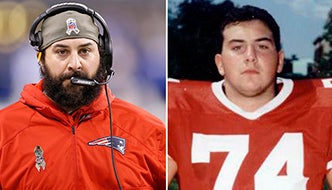
Matt Patricia ’96, former defensive coordinator for the New England Patriots, got his playing and coaching start at Rensselaer.
For the first time in Institute history, a Rensselaer graduate has been named head coach of a National Football League franchise. Matt Patricia ’96, defensive coordinator of the New England Patriots with whom he made six trips to the Super Bowl, was named head coach of the Detroit Lions.
In the lead-up to the announcement Feb. 5 that Patricia would lead the Lions, a flurry of articles appeared examining his past accomplishments, upbringing, even his beard. Not one failed to mention that he is, truly, a rocket scientist.
In January, with the ink all but signed on the deal, two reporters from Sports Illustrated visited campus to experience exactly the kind of course Patricia would have taken as an undergraduate. They sat in on a Space Flight Mechanics class in DCC 330, taught by Kurt Anderson, professor and associate dean of mechanical, aerospace, and nuclear engineering.
“Patricia’s reputation as the only rocket scientist coaching in the NFL precedes him,” they wrote. “He graduated from RPI in 1996, earning his degree from the School of Engineering’s Mechanical, Aerospace, and Nuclear Engineering Department, while also suiting up as an undersized offensive lineman for a football team that then played its games on a tiny field a few steps from this classroom (capacity: 1,000).”
During a break in the two-hour class, the reporters spoke with Anderson.
“Engineers are taught to be logical, to look at data, and then find good solutions based on that data,” Anderson said, “and from what I’ve seen on a football field, that is largely what he’s doing, though his system is a little bit more chaotic than the ones I deal with.”
Patricia, who was featured in the fall 2016 issue of Rensselaer magazine, discovered the joy of coaching when he served as a graduate assistant to Rensselaer Coach Joe King while pursuing his MBA on campus.
“It was during that year I received my first taste of how thrilling it was to see a player you were helping coach make a fantastic play,” he said. That feeling—focusing on the players and their potential, not just the plays and plans—never left me.”
To read the full article, click here.


